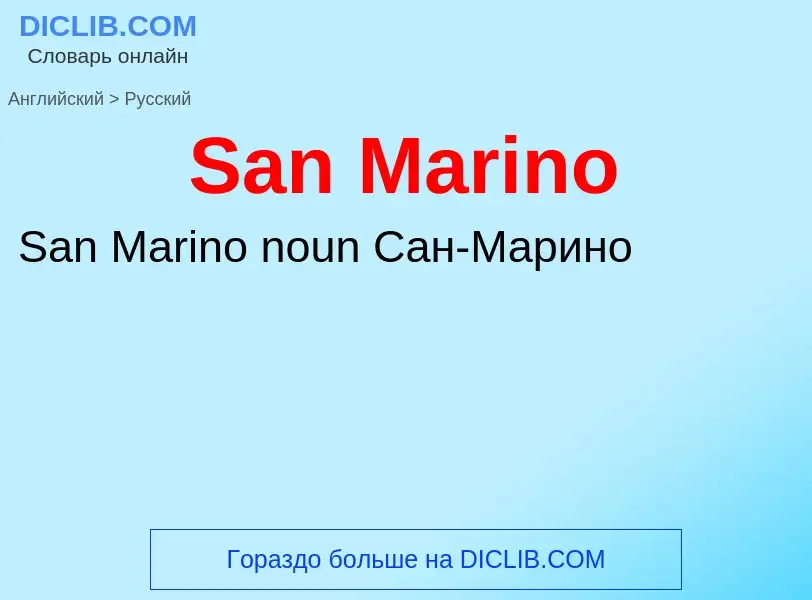Перевод и анализ слов искусственным интеллектом ChatGPT
На этой странице Вы можете получить подробный анализ слова или словосочетания, произведенный с помощью лучшей на сегодняшний день технологии искусственного интеллекта:
- как употребляется слово
- частота употребления
- используется оно чаще в устной или письменной речи
- варианты перевода слова
- примеры употребления (несколько фраз с переводом)
- этимология
San Marino - перевод на Английский
[sɑ:nmə'ri:nəu]
география
Сан-Марино
существительное
общая лексика
Сан-Марино
[sænkri'stəub(ə)l]
география
о-в Сан-Кристобаль
Определение
Википедия
San Marino ( (listen), Italian: [sam maˈriːno]), officially the Republic of San Marino (Italian: Repubblica di San Marino; Romagnol: Ripóbblica d' San Marein), also known as the Most Serene Republic of San Marino (Italian: Serenissima Repubblica di San Marino), is the fifth-smallest country in the world and a European microstate in Southern Europe enclaved by Italy. Located on the northeastern side of the Apennine Mountains, San Marino covers a land area of just over 61 km2 (23+1⁄2 sq mi), and has a population of 33,562.
San Marino is a landlocked country; however, its northeastern end is within ten kilometres (six miles) of the Italian city of Rimini on the Adriatic coast. The nearest airport is also in Italy. The country's capital city, the City of San Marino, is located atop Monte Titano, while its largest settlement is Dogana within the largest municipality of Serravalle. San Marino's official language is Italian.
The country derives its name from Saint Marinus, a stonemason from the then-Roman island of Rab in present-day Croatia. Born in AD 275, Marinus participated in the rebuilding of Rimini's city walls after their destruction by Liburnian pirates. Marinus then went on to found an independently ruled monastic community on Monte Titano in AD 301; thus, San Marino lays claim to being the oldest extant sovereign state, as well as the oldest constitutional republic.
Uniquely, San Marino's constitution dictates that its democratically elected legislature, the Grand and General Council, must elect two heads of state every six months. Known as captains regent, the two heads of state serve concurrently and hold equal powers until their term expires after six months.
The country's economy is mainly based on finance, industry, services, retail, and tourism. It is one of the wealthiest countries in the world in GDP per capita, with a figure comparable to the most developed European regions. Its health care system ranks 3rd in the World Health Organization first ever analysis of the world's health systems. Despite this fact, ranking 44th, its Human Development Index score is the lowest in Western Europe.

![Alessandro Rossi]], [[Alessandro Mancini]], and [[Alberto Selva]] Alessandro Rossi]], [[Alessandro Mancini]], and [[Alberto Selva]]](https://commons.wikimedia.org/wiki/Special:FilePath/Captains Regent Tomassoni, Rossi, Mancini and Selva.jpg?width=200)
![[[San Marino Cathedral]] [[San Marino Cathedral]]](https://commons.wikimedia.org/wiki/Special:FilePath/Cathedral San Marino - Exterior.jpg?width=200)
![Aerial tramway to [[Monte Titano]] Aerial tramway to [[Monte Titano]]](https://commons.wikimedia.org/wiki/Special:FilePath/Funivia di San Marino - 2019-05-07.jpg?width=200)
![2005 [[San Marino Grand Prix]] held in [[Imola]], Italy 2005 [[San Marino Grand Prix]] held in [[Imola]], Italy](https://commons.wikimedia.org/wiki/Special:FilePath/GP Imola2005 SchumiAlonso.jpg?width=200)
![Guards of the Rock]] Guards of the Rock]]](https://commons.wikimedia.org/wiki/Special:FilePath/Guardia di Rocca al Palazzo Pubblico San Marino.jpg?width=200)
![Illustration of [[Saint Marinus]], the founder of the Republic of San Marino and prominent cultural figure Illustration of [[Saint Marinus]], the founder of the Republic of San Marino and prominent cultural figure](https://commons.wikimedia.org/wiki/Special:FilePath/Marino als steinhauer.png?width=200)
![Palazzo Pubblico]], seat of the government of San Marino Palazzo Pubblico]], seat of the government of San Marino](https://commons.wikimedia.org/wiki/Special:FilePath/Parliament San Marino.jpg?width=200)
![A ''[[piadina]]'', a dish characteristic of the Italian region of Romagna and of its enclave of San Marino A ''[[piadina]]'', a dish characteristic of the Italian region of Romagna and of its enclave of San Marino](https://commons.wikimedia.org/wiki/Special:FilePath/Piadina.jpg?width=200)

![[[Administrative division]]s of San Marino [[Administrative division]]s of San Marino](https://commons.wikimedia.org/wiki/Special:FilePath/San Marino.png?width=200)
![View of the ''[[Guaita]]'' defensive wall View of the ''[[Guaita]]'' defensive wall](https://commons.wikimedia.org/wiki/Special:FilePath/San Marino - Cloudy sunset.jpg?width=200)


![The fortress of ''[[Guaita]]'' on [[Mount Titano]] The fortress of ''[[Guaita]]'' on [[Mount Titano]]](https://commons.wikimedia.org/wiki/Special:FilePath/View of Mount Titano - San Marino.jpg?width=200)
